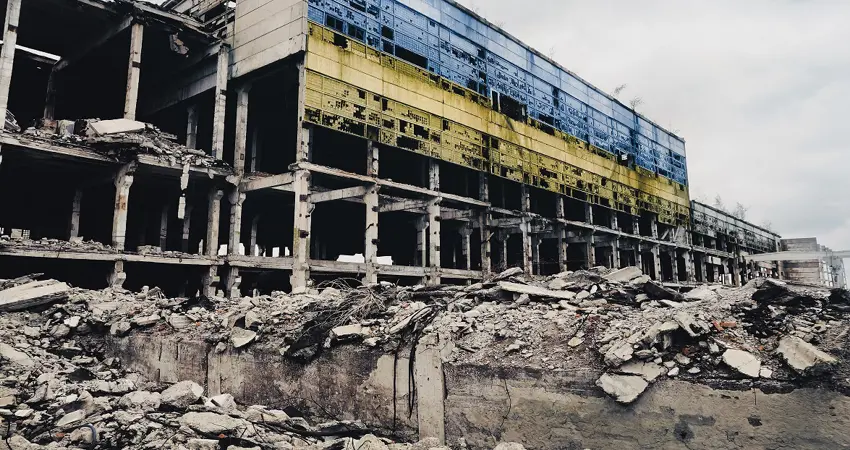03 May 2024
Multi-partner team to take forward UK Government-funded project supporting Ukraine’s energy recovery
In a 2-year project, the team members will develop low-energy ‘Green Building Materials’ technologies by safely and sustainably upcycling some of the estimated 1.4bn tons of rubble generated during the Russian invasion

Stock image showing rubble caused by shelling and air strikes in Ukraine
A multi-institution team of academics and researchers, led by the University of Sheffield, are to work with Ukrainian colleagues in academia and industry to help in the reconstruction of Ukraine. In a 2-year project, the team members will develop low-energy ‘Green Building Materials’ technologies by upcycling rubble generated during the Russian invasion in a safe and sustainable manner.
The invasion has destroyed Ukraine's infrastructure through continuous shelling and missile attacks, with the amount of rubble created currently estimated to be about 1.4bn tons. The rubble contains legacy asbestos as well as non-traditional concrete such as alkali-activated materials, which makes using the rubble particularly challenging.
Rebuilding will involve a massive amount of construction activity, with a potentially significant impact on the environment. Even under normal circumstances society faces a growing problem when it comes to management of construction and demolition waste. Across the world, a common approach is to reuse demolition waste in low-grade applications such as backfill or even just landscaping. This is an immense waste of resources, with associated environmental and economic costs.
The Safe, Sustainable and Swift Reconstruction of Ukraine project (S3RU), funded by the UK Foreign, Commonwealth and Development Office (FCDO) aims to upcycle the rubble into low-energy and low-carbon construction materials to create a circular economy. At the same time it will be developing technologies that could help the UK reach its own Net Zero target.
The project will innovate in five major areas:
- rapid detection and surveying of rubbles suitable for upcycling,
- piloting a fully mobile truck-mountable/mobile concrete separation process,
- developing and optimising upcycling pathways of the separated components,
- life cycle assessment and techno-economic analysis, and
- raising awareness amongst the Ukrainian people about the dangers of asbestos and benefits of recycling.
The University of Oxford is one of multiple partners in the project which brings together engineers and scientists from a wide range of universities and companies. Professor Emilio Martínez-Pañeda, leading the Oxford effort for the Department of Engineering Science, says, “Oxford’s role will be to use advanced computational techniques to establish a new generation of thermo-mechanical separation methods that will enable rubble and concrete separation at minimal energy cost”.
Rapid detection of waste concrete suitable for upcycling will be carried out using commercially state-of-the-art handheld equipment, whilst a novel mobile light-scattering equipment will distinguish asbestos fibres from other material, enabling them to be separated. The waste concrete that does not contain asbestos or alkali-activated concrete will be thermo-mechanically separated into different components and used either for making fresh concrete, as a supplementary building material or for manufacturing Portland cement via a new microwave-assisted ‘sintering’ (compacting and forming a solid mass of material by pressure or heat) technique.
The energy requirements, costs, and environmental impacts, including the carbon footprint of these upcycling processes will be calculated and used to understand how this can be made economic as well as sustainable. A toolbox will be created to recommend upcycling processes based on the availability of suitable rubble and its chemical composition. It is hoped that raising awareness about a circular economy and sustainability will have impacts beyond the initial work of upcycling concrete rubble.
The project is funded by UK International Development and hosted by British Embassy Kyiv.




